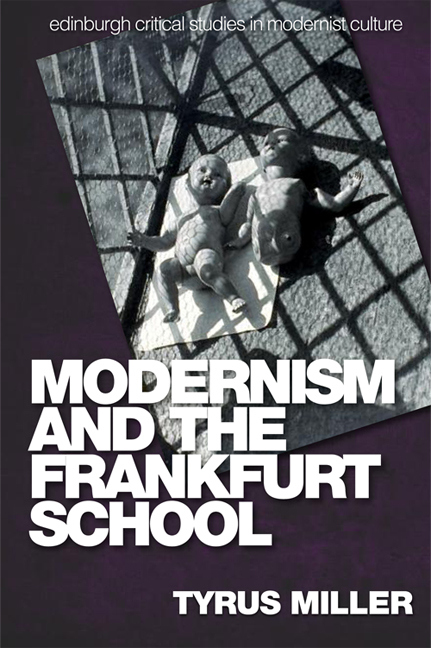1 - Modernism and the Frankfurt School
Summary
The several different incarnations of the Institut für Sozialforschung (Institute for Social Research) that existed in various locations in Europe and the United States from the 1920s to the 1970s, as well as its broader intellectual legacy and afterlife in the work of a wide range of thinkers, have come to be known collectively as “the Frankfurt School.” It is a vague and in many respects imprecise designation, since it suggests more cohesion and homogeneity than can readily be ascribed to the successive phases of the Institute's existence, its defining thinkers affiliated in different periods, and its thematic emphases in research and publication. Further contributing to the term's imprecision is the broad impact the work of the Institute had on a range of disciplines and individuals, both in academic and in activist circles. The Frankfurt School represented one of the most influential tendencies in social, political, and cultural thought of the twentieth century, and it is notoriously difficult to circumscribe its boundaries and reach. Few, for example, would consider the late Edward Said a “Frankfurt School” thinker; yet his last book masterfully applied and extended Theodor Adorno's notion of “late style,” originally developed in connection with Beethoven's late piano concertos and his Missa Solemnis, to a number of literary and musical examples. I will deal with such definitional complications largely by brushing them aside, in order not to get distracted from my primary concerns. Other studies have dealt with the complex formation, internal divisions, and canonization of “the Frankfurt School,” and that is not my task here. From the outset, I will simply register the limits of the designation's conceptual and historiographic precision, and go on to employ it pragmatically to focus in on the main concerns of this study: the theory of modernism and the avant-garde articulated by three key thinkers who are typically considered defining figures in the founding “Frankfurt School”: Walter Benjamin, Theodor Adorno, and Herbert Marcuse.
- Type
- Chapter
- Information
- Modernism and the Frankfurt School , pp. 1 - 34Publisher: Edinburgh University PressPrint publication year: 2014



